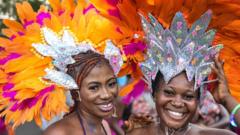The festive ambiance enveloping Calabar, Nigeria's southern port city, draws crowds for what is dubbed "Africa's biggest street party" during the Christmas season. The Calabar Carnival, a month-long celebration artistic display of music, dance, and culture, aims to unite people and promote local traditions.
The 2023 edition has seen participation from at least 14 carnival bands, with performers showcasing unique costumes inspired by Nigeria's rich ethnic diversity. According to organizers, the carnival attracts approximately two million attendees, blending revelers from different parts of Nigeria and beyond. The celebratory atmosphere is accentuated by the vibrant rhythms of Afrobeats, resonating from large speakers that fuel the dancers' energy.
Grace Job, an enthusiastic participant, shared her excitement, stating, "We are seeing different designs, different costumes. The energy is so much." The costumes often reflect significant historical themes, reminding attendees of the city’s ties to the Atlantic slave trade and colonial history. For instance, some outfits symbolize manillas—brass bracelets used as currency in the past—while others are reminiscent of colonial coins.
The festivities are not solely about the parade; they also feature major performances from well-known Nigerian artists. A concert held at a local stadium showcased talented musicians such as Runtown and Iyanya, while this year's top honor for best carnival band went to Calas Vegas for the second consecutive year.
The Cross River State government hosts the carnival, viewing it as a means to boost tourism and showcase local culture not only to Nigerians but also to a global audience, including the diaspora. Local dancer and civil engineering student Rejoice Elemi emphasized, "Everyone is trying to showcase the tradition and the culture," capturing the essence of this spirited event.
As the carnival continues over the festive season, it remains a profound expression of unity and cultural pride that resonates deeply with both participants and spectators alike. The event serves as a reminder of Nigeria's diverse heritage while paving the way for future cultural celebrations.



















